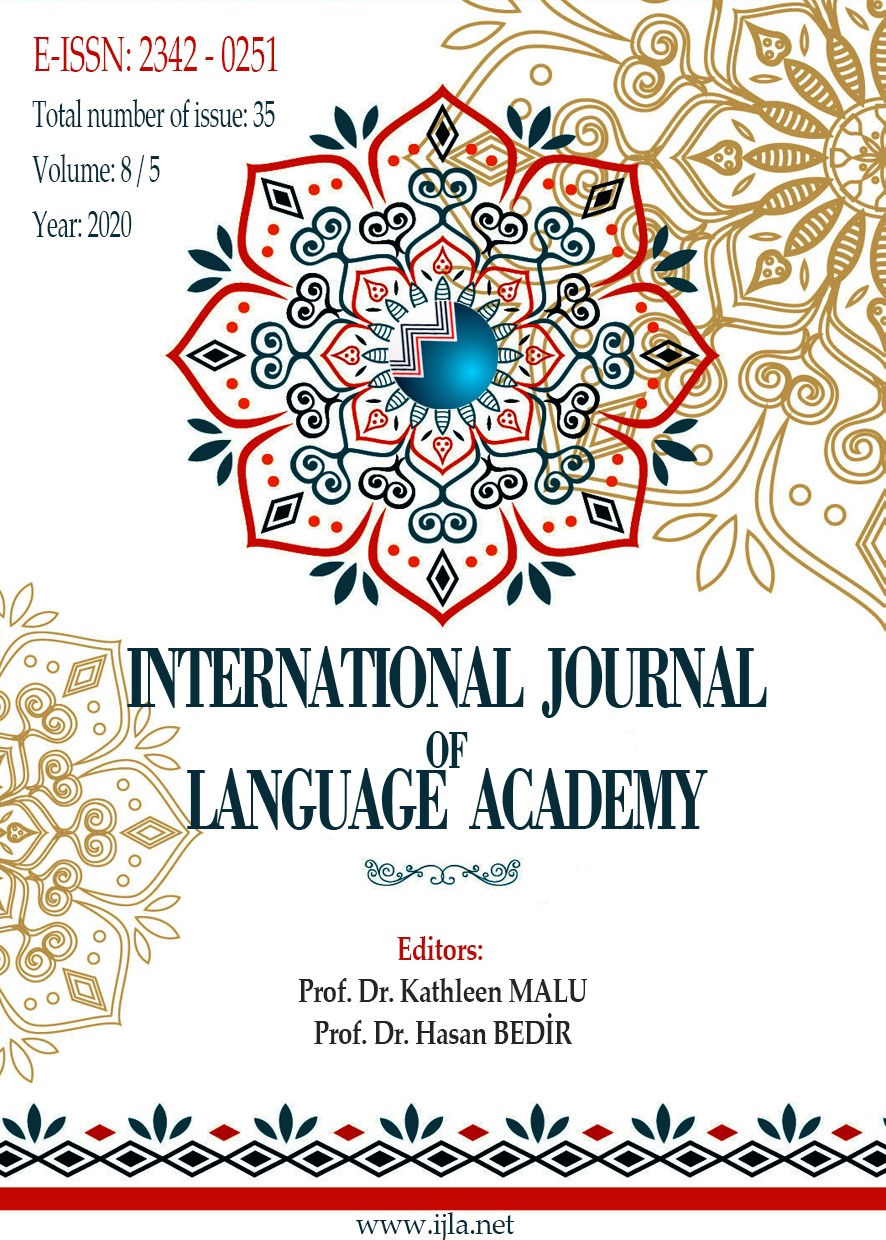Author :
Abstract
Türetim süreçleri, karmaşık bir anlam ve sözcük oluşturma işlemidir ve bu çalışmada temel araştırma nesnesi olarak belirlenmiştir. Çalışma, George Orwell’in 1984 adlı distopyasındaki Yenisöylem sözcüklerinin Türkçe karşılıklarında özgün metindeki türetim süreçlerinin mi işletildiğini, yoksa Türkçenin tipolojik özelliklerine uygun sözcük oluşturma yöntemlerinin mi yeğlendiğini saptamayı amaçlamıştır. Bu amaç doğrultusunda, yabancı dilden bir sözcüğün Türkçeye çevrilmesi aşamasında seçilen türetim süreçlerinin görülme sıklıkları betimlenmiş, ilişki arayıcı araştırmalar için zemin hazırlanmıştır. Orwell’in söz konusu İngilizce metnindeki 74 Yenisöylem sözcüğü ve bunların Türkçede 1984 ve 2012 yılları arasında yayımlanmış üç farklı çevirisindeki karşılıkları Belge Tarama (Document Scanning) yöntemiyle saptanmıştır. Elde edilen veriler Plag (2002) ve Lieber’in (2009) sözcük oluşturma yöntemlerine yönelik yaptıkları çalışmalar doğrultusunda sınıflandırılarak incelenmiş ve dağılım sıklıkları hesaplanmıştır. Buna göre, Yenisöylem sözcüklerinin en sıklıkla bileşme (% 56.76 %) > ekleme (%37.84) > karma (%13.51) yoluyla oluşturulduğu bulgulanmıştır. Bu sözcüklerin Türkçe çeviri karşılıklarında ise bileşme (%59.7) > ödünçleme (%50) > eklemenin (%16.8) yeğlendiği belirlenmiştir. Elde edilen veriler özgün metinde en sık yeğlenen sözcük oluşturma düzeneğinin, ait olduğu doğal dildeki genel eğilimle koşutluk gösterdiğini ortaya koymuştur. Yenisöylem sözcüklerinin Türkçe karşılıklarının seçiminde ise Türkçenin tipolojik özelliklerine uygun sözcük oluşturma yöntemlerinden ilki olan ekleme değil bileşme yeğlenmiştir. Elde edilen bu sonuç sözcüklere Türkçe karşılık bulunurken özgün metne sadık kalma, yazar biçemini koruma ve mesajı iletme kaygısı ile ilişkilendirilmiştir.
Keywords
Abstract
Derivational processes are operations which create a complex a lexical item with a complex semantic content and it is the main research object of the study. This article aims to find out whether Turkish equivalents of Newspeak words by George Orwell’s 1984, a dystopic novel, are a by-product of derivational processes of the original text or a by-product of derivational processes in compliance with the typological properties of Turkish. To this end, we described the frequency of derivational processes preferred within the phase of Turkish translation of a foreign word. Besides, we also built up a background for researches seeking for this relation. The study employed Document Scanning method to find out the equivalents of three different translations of Orwell’s 74 Newspeak words published in Turkish between 1984 and 2012. The data obtained were analyzed by classifying in accordance with the studies of word formation methods by Plag (2002) and Lieber (2009), and distributional frequencies were also calculated. Findings of the study show that the most frequent word formation methods in Newspeak words are compounding (56.75%) > affixation (37.84%) > blending (13.51%). Turkish equivalents of the translations show that the most frequent word formation methods are compounding (59.7%) > borrowing (50%) > affixation (16.8%). The findings of the study indicate that the general trend of word formation methods in the natural language is parallel to that of the original text. As for the Turkish equivalents of Newspeak words, compounding is mostly employed on the contrary to the general expectation ‘derivation’ which is the most typical derivational process of Turkish. This result is identified with sticking to the original text so as to maintain the style and convey the message of the author.
